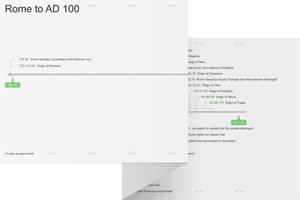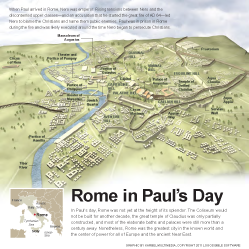16:1–21 The angels carrying the seven bowls of God’s wrath pour them out upon the world. The bowls are God’s final judgment prior to the great white throne judgment in ch. 20. These judgments are similar to the plagues on Egypt and the trumpet judgments earlier in the book (compare Exod 7–12). |
16:1 loud voice While generally anonymous in Revelation, this likely refers to God’s voice; no one could enter the temple because His presence was there.
16:2 evil and painful sore Describes oozing, open wounds or ulcers, corresponding to Exod 9:8–12.
mark of the beast See note on Rev 13:16.
worshiped his image See 13:14–15.
16:3 blood, like that of a dead person This judgment and the one that follows mirror Exod 7:17–24.
every living thing In contrast to the one-third that perished as a result of the second trumpet judgment (see Rev 8:8).
16:4 they became blood Compare 8:10–11, where the rivers and streams are made bitter.
16:5 angel of the waters See 14:18 and note.
16:6 they have poured out the blood Those who delighted in shedding blood now are forced to drink blood as a fitting form of punishment.
16:7 I heard the altar saying Refers to those that dwell beneath the altar —the martyrs. This is the ultimate vindication in response to their query in 6:10.
—the martyrs. This is the ultimate vindication in response to their query in 6:10.
righteous God has avenged the blood of the martyrs. The murderers received righteous retribution.
retribution.
16:8 it was granted Passive verbs in Revelation often connote divine permission (e.g., 6:4; 9:5 and note; 13:5, 7, 15). Here, the sun is an instrument of divine wrath.
16:9 were burned up Or received severe burns.
who has the authority over these plagues Because Yahweh was responsible for the plagues, the wicked cursed His name.
they did not repent to give him glory They did not glorify Him or acknowledge His power, but they will be forced to do so. Compare 2:5 and note; 9:20 and note.
16:10 the fifth The first four bowls were directed toward the natural world. This is a frontal assault on evil.
throne of the beast The symbol of the beast’s power (see 13:2). In John’s day, this was Rome and its divine pretensions, which were ultimately satanic (see 2:13 and note).
darkened Corresponds to Exod 10:21–23, where the darkness is centralized in Egypt (compare Rev 8:12).
they began chewing their tongues May connote confusion and mental derangement brought on by prolonged, intense physical suffering.
because of the pain Caused by the sores, thirst, and burns inflicted so far.
16:11 they blasphemed the God of heaven The people’s typical response (compare v. 9).
16:12 Euphrates The Euphrates River served as Rome’s eastern border and protected Rome from invasion by the Parthian Empire. If the Euphrates were to dry up, Rome would be threatened.
the kings from the east If the Nero redivivus myth is the background for this imagery, then this refers to the Parthians led by Nero.
the beast The first beast (see 13:1 and note).
the false prophet The second beast (see 13:11 and note).
(see 13:11 and note).
three unclean spirits like frogs Corresponds to Exod 8:1–15. Evil spirits, not literal frogs, are in view here.
16:14 performing signs These demons summon people to battle and authenticate their message with signs. Ironically, though they were commissioned by the unholy trinity, they unknowingly work for the Holy Trinity
Ironically, though they were commissioned by the unholy trinity, they unknowingly work for the Holy Trinity by gathering the nations together in one place for judgment.
by gathering the nations together in one place for judgment.
the whole inhabited world Refers to all the kingdoms of the world, including the vassals of Rome.
the great day of God the All-Powerful Refers to judgment day (see Joel 2:11).
16:15 like a thief After mentioning the Day of the Yahweh (the Lord) in the previous verse, John inserts a parenthetical statement describing Christ’s return in judgment (compare Matt 24:43–44; 1 Thess 5:2; 2 Pet 3:10).
Blessed is The third beatitude in Revelation (see Rev 1:3 and note).
they see his shamefulness In the ancient Near East, conquering armies often paraded prisoners of war naked to expose them to as much shame as possible (compare Ezek 23:24–29).
as possible (compare Ezek 23:24–29).
16:16 Armageddon The Greek word used here, harmageddōn, could be a reference to Megiddo in the Esdraelon plain, but this is not definitive since Megiddo is a plain, not a mountain (the first part of the Greek word, har, is Hebrew for “mountain”). In the ot, Megiddo was the site of significant conflicts (e.g., Judg 5:19; 2 Kgs 9:27; 2 Chr 35:22). John may be drawing on a well-known battle site to indicate symbolically the final conflict between God and the dragon, as he has elsewhere drawn on the symbolism associated with Babylon (see Rev 14:8 and note) and Mount Zion (see 14:1 and note).
16:17 the seventh poured out his bowl Since this angel pours from heaven, he continues to pour in a downward direction. In contrast with the seal and trumpet judgments, no interlude takes place between the sixth and seventh bowls—the time allotted for repentance has passed.
loud voice God’s voice (see v. 1 and note).
16:18 time humanity has been on the earth A hyperbolic way of saying “the most violent earthquake of all time.”
16:19 the great city Probably refers to Rome (see 17:18 and note; 18:10–24); Jerusalem is also possible (see 11:8).
(see 17:18 and note; 18:10–24); Jerusalem is also possible (see 11:8).
Babylon the great Refers to Rome (see 14:8 and note).
(see 14:8 and note).
16:20 every island fled Because of the quake in v. 18, the earth appeared to be running away. This type of language is used to describe divine punishment in the ot (e.g., Nah 1:3–5).
16:21 about a hundred pounds Hailstones of this size would bring total destruction. Such a storm would level cities, obliterate forests, and leave few survivors among people or animals. This final bowl judgment brings wholesale devastation upon the earth.

|
About Faithlife Study BibleFaithlife Study Bible (FSB) is your guide to the ancient world of the Old and New Testaments, with study notes and articles that draw from a wide range of academic research. FSB helps you learn how to think about interpretation methods and issues so that you can gain a deeper understanding of the text. |
| Copyright |
Copyright 2012 Logos Bible Software. |
| Support Info | fsb |
 Loading…
Loading…



